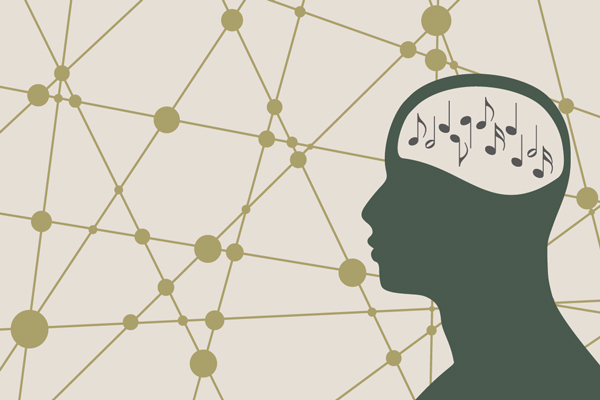Music has a bewitching power when it comes to our thoughts and emotions. If you’ve ever cried to a sad song, hidden beneath blankets under the influence of scary music from a horror film, or swelled with a sense of heroism on hearing a rousing tune, you’ll agree. Here’s a look at the neuroscience behind music, and how a simple series of sounds can have weighty impacts in our minds.

Music and the Brain
The psychology of music has been recognized and studied since ancient times, with Plato theorizing that different styles of music stirred different emotions in listeners. Pull up your favorite song or the soundtrack from a horror movie, and you’ll see that he was right. It’s easy to understand that music has a profound effect on us, but modern science has given us clearer glimpses at the neuroscience of music, and why and how music plays with our minds.
Our favorite songs arouse emotions, memories, and even physiological responses like dilated pupils and increased pulse and blood pressure. There is also increased activity in the cerebellum, the region of the brain associated with movement. Interestingly, these intense reactions occur just before our favorite parts of songs, in the so-called “anticipatory phase.” It’s conjectured that this build-up of anticipation, along with subverted expectations in musical patterns, is what primarily heightens our enjoyment and engages our brains.
Because of the ways music influences us, we can—and do—use music to achieve desired results! As music’s effects are more studied and better understood, we can use that information to “hack our brains” with powerful song choices. Here’s a look at some examples of using music to support therapy, sleep, and focus.
Music as Therapy
The use of music in the realm of medicine is impressively far-reaching. It’s been known to assist in therapy and healing for a wide range of illnesses and conditions. Studies have demonstrated the significant therapeutic value of music for patients with:
- Stroke
- Parkinson’s disease
- Cerebral palsy
- Traumatic brain injury
- Memory disorders such as Alzheimer’s disease
- Epilepsy
Music can also help with mental health by regulating mood, reducing stress, and promoting calm and positivity.
At Levine, we have a full team of board-certified music therapists who are trained to access the therapeutic value of music to help others connect and grow. Our experts work with children and adults of all ages in private and group music therapy sessions using evidence-based practices. In this way, we use music therapy to assist people with a wide variety of needs.
A child with autism spectrum disorder may engage in music therapy sessions to help find their inner voice and connect with the world around them, while an adult with anxiety may be working to manage stress and increase coping mechanisms through musical interactions. In the community, we can work with adults with memory disorders to encourage socialization and reality orientation while also supporting their caregivers with stress relief and self-care. Every session or group is unique, just like every individual has unique strengths, needs, and responses to music.

Music for Sleep
Music can also be helpful for inducing sleep. Relaxing songs can help reduce your heart rate and blood pressure, distract you from worries that might be keeping you awake, and negate distracting background noise like passing traffic. Generally, slow songs are recommended for sleep, particularly ones that range from 60-80 beats per minute. Make sure your sleep playlist caters to your musical preferences so you can get the best results!
Focus Music
Music is also commonly used to help with concentration. Motivating, inspirational tracks, such as those commonly found in movie soundtracks, can help you get into the zone when working, studying, or even exercising. A study of the effects of music on worker concentration found that music influenced focus but that the key component was not the style of music but the preferences of the listener. Songs that a worker disliked would negatively impact their concentration. When it comes to choosing music that helps you focus, your taste is key!
Music and Emotion
Aside from influencing our brains to focus, sleep, or heal, music also has a strong effect on our emotions. It can make us smile or cry, feel triumph or fear. In fact, researchers mapped 13 key emotions that music triggers in people across cultures:
- Amusement
- Joy
- Eroticism
- Beauty
- Relaxation
- Sadness
- Dreaminess
- Triumph
- Tension
- Fear
- Annoyance
- Defiance
- High energy (feeling pumped up)
Composers play upon these emotions when scoring films, employing different scales, tempos, instrumentation, and more to elicit specific feelings in the audience. Soundtracks are a vital part of the movie experience, framing our perception of what we’re seeing and our empathy with the characters on screen. Listen to the Psycho suite for an instant rush of fear, or dwell in ethereal dreaminess with the elven themes from The Lord of the Rings. These iconic soundtracks, among so many others, are striking examples of how music moves us.
If you’re interested in learning how to move people with your music, check out our composition course, or any of our wide range of music lessons for all ages! We offer outstanding music instruction and programs to students of all ages, interests, and skill levels at six campuses in the DC area. At each Levine campus, our students find a diverse range of musical activities, a supportive environment, and dedicated teachers to challenge their creative limits and to guide them. We also offer online learning!
Our music therapy program serves individuals of all ages and needs at each Levine campus and in the community through a variety of partnership programming. From classes focusing on healthy aging for older adults to individual sessions for children focusing on language development, our programming helps forge those powerful therapeutic connections between music, health, and wellbeing.
Here at Levine Music, our core values—excellence and opportunity—infuse everything we do. Learn more about our program areas and upcoming performances, and donate today to help us bring lifelong joy and inspiration through music!
